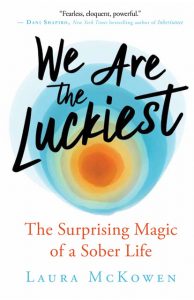
An excerpt from We Are the Luckiest by Laura McKowen
Before Laura McKowen got sober, she had a long, successful career in public relations in the Mad Men-esque drinking culture of the advertising industry, where “liquid lunches were frequent and drinking at your desk in the late afternoon was perfectly normal.” In the five years since she stopped drinking, she has become one of the foremost voices in the modern recovery movement.
In her new memoir We Are the Luckiest: The Surprising Magic of a Sober Life (New World Library, January 7, 2020), McKowen flips the script on how we talk about addiction and encourages readers not to ask, “Is this bad enough that I have to change?” but rather, “Is this good enough for me to stay the same?”
We hope you’ll enjoy this excerpt from the book.
I knew drinking was going to be my thing long before the night of our mom’s sixtieth birthday party, even if I refused to let that knowing arrive fully into my consciousness. I knew it in college when one of my guy friends, while retelling a story from a crazy party we’d been at the night before, joked that I probably wouldn’t remember — because I was always too drunk to remember — and I felt like crawling into a hole and dying.
I knew it in my twenties, living in Boston, when my girlfriends continually joked about whose turn it was to take care of me, before we went out to the bars.
I knew it by the urgency I felt chugging champagne before my wedding, and I knew it later, after my husband and I learned I was pregnant. I drank the occasional glass here and there throughout my pregnancy — sometimes pushing the limit from one to one and a half glasses — but aside from the wine not feeling good physically, I realized how much I relied on it to soften my experience.
It was so incomplete to me, so unsatisfying, to have only one glass. To have a limit.
Often in those pregnant months, I’d be going about my day and suddenly be struck by an overwhelming urge to reach for wine. Something to take the edge off. And not being able to drink sent a surprising jolt of panic through me. Before my pregnancy, my drinking could at least be contextualized. I was having fun, going out after work, hanging out with the girls, Sunday Funday, “relaxing.” But now that I couldn’t have a drink anytime I wanted one, it was alarming how often I wanted one.
It was the first time it had scratched at my consciousness that perhaps drinking had morphed elusively into something I not only liked but also needed. If not physically, then certainly emotionally.
I’m not sure if you’ve ever needed something like this.
Maybe you top off your drink when nobody’s looking, like I used to do. Maybe you’re like my friend Brent and you eat McDonald’s Big Macs and whole Domino’s cheese pizzas in your car on the way home from work, before dinner. Maybe you can’t leave a man who regularly beats the hell out of you, even though when he knocked you unconscious last week, you swore it was the last time. Maybe you’re the one who’s been slicing into your body with razor blades since you were sixteen, because the pain needs a place to go.
Maybe — maybe your thing is less severe or more socially acceptable, like staying at the office past your kids’ bedtime most nights because work is the only place you feel in control, or maybe you wrestle with crippling perfectionism. Maybe it’s the red-hot hatred you feel toward every woman pushing a stroller since you discovered you couldn’t get pregnant last spring, or maybe you keep trying to untangle the knot of rage in your chest that just never leaves.
I don’t know what your thing is, but alcohol was mine.
And here is the thing we must know about our things if we are ever going to survive them: We believe we can bury them, when the truth is, they’re burying us. They will always bury us, eventually.
If you know your thing, that’s good news, although I know it doesn’t feel that way. It doesn’t mean it’s fair. It doesn’t mean letting go and moving through will be easy. It doesn’t mean you have any idea what the f@#k to do next — I certainly didn’t. It just means you’re no longer willing or able to fight to keep it in your life.
Laura McKowen is the author of We Are the Luckiest. She is a former public relations executive who has become recognized as a fresh voice in the recovery movement. Beloved for her soulful and irreverent writing, she leads sold-out yoga-based retreats and other courses that teach people how to say yes to a bigger life. Visit her online at www.lauramckowen.com.
Excerpted from the book We Are the Luckiest. Copyright ©2020 by Laura McKowen. Printed with permission from New World Library.
